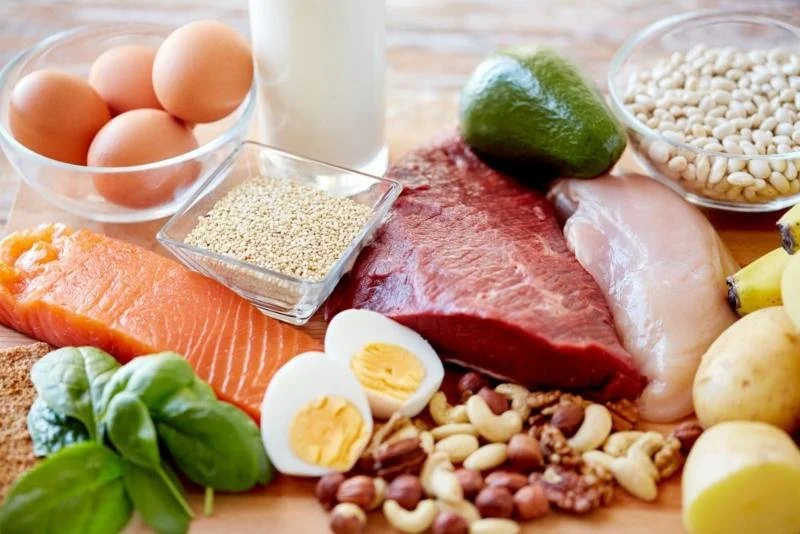Eat More to Lose Fat
Protein
Why is it important?
When it comes to exercise and strength training, protein typically gets the most attention. And rightfully so. When we workout, we're breaking down muscle. In order to recover and improve, our muscles need amino acids (the building blocks of protein) to rebuild. Providing our bodies with adequate protein is one of the most important nutritional considerations for anyone, especially if you're physically active.
Beyond muscle recovery and repair, amino acids are used to produce a lot of important molecules in the body, including enzymes, hormones and antibodies. Protein also transports substances in the body, and helps replace worn out cells.
Sources of Protein
Protein is found in many different types of food, but animal products (eggs, beef, chicken, pork, fish, and dairy products) are by far the most concentrated sources. While plant sources typically aren't as "protein-dense," some good options include legumes (like beans and lentils), soy (like tofu), nuts, and seeds.
Animal vs. Plant
You can certainly get all the essential amino acids from both plant and animal sources. Animal sources tend to be easier, as they provide a more concentrated source of all the essential amino acids, while many plant sources need to be combined to create a "complete" protein. That being said, there can be advantages to eating more plant protein, as these sources come with many other important nutrients.
Protein powder can be a very convenient option, but make sure it doesn't come with other garbage ingredients mixed in. There are great options for animal-based powders (whey, casein, egg) and plant-based powders (pea, hemp, rice, soy).
How much?
The typical recommendation you see (46-56 g/day) on labels is meant to "prevent deficiency." That does NOT mean it is optimal, especially if you're regularly exercising and strength training.
For active individuals, especially those taking part in high-intensity exercise and strength training, 0.6-1 g per pound of body weight is a good range to ensure proper recovery and protein synthesis in the body. So a 150 lb person should shoot for a minimum of 100 g of protein per day. This may be higher than a lot of people think. But it is not for the "general" population - it's for the active population.
For people with more than 50 lbs of fat to lose, staying at the lower end of the range is okay (0.6-0.7 g per pound of body weight), but they may find themselves at the higher end of the range as their weight decreases.
When looking at a percentage of total calories, 25-35% is a good range to shoot for. If you're eating 2000 calories, 30% would be 150g of protein.
It's also important to note that we should spread our protein throughout the day. Rather than eat 20 grams in the morning, and nothing until you gorge on 100 grams for dinner, we should try to distribute it into a couple of servings throughout the day. Don't let it stress you out, but try to spread it over at least two or three meals.
Can you eat too much?
In healthy individuals, high-protein diets do not cause kidney damage as you may have heard. That being said, for most people there will not be much benefit beyond 1-1.2 grams of protein per pound of bodyweight (that amount would be on the high end). If you're looking for more calories, it would be better to focus on extra vegetables. And if you have any kidney issues, you'll want to check with your doctor on the appropriate amount of protein for you.
Other benefits
Protein is highly satiating, meaning it can fill you up and reduce hunger and appetite. People eating more protein often find themselves eating fewer calories overall, as they feel less likely to snack. If you find yourself hungry in the middle of the afternoon, consider a high-protein snack (mixed nuts, jerky, apple with peanut/almond butter).
For people looking to lose fat, protein may be the most important nutritional component. It helps prevent muscle loss when losing weight. The weight that you lose will much more likely be from fat (as opposed to muscle).
When trying to lose weight, combining a moderately high protein intake with strength training will put you on the best path to long-term success. You'll be able to maintain or even increase muscle mass (improving strength and keeping your metabolism higher), which will keep your weight loss more permanent and prevent the typical "yo-yo" changes in your weight.
Conclusion
Protein intake is an incredibly important aspect of your nutrition, especially when you're active and strength training (like all of our bStrong members are). Whether you eat animal products or focus on plant-based eating, it's important to prioritize protein sources at each meal. This will ensure that you're getting the most out of every workout, and setting yourself up for optimal health and performance.

